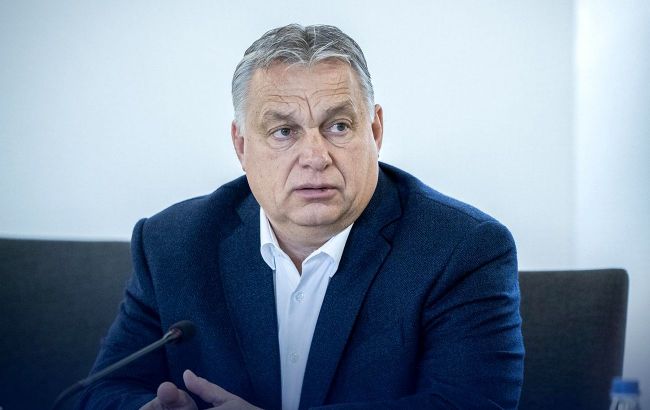Hungary-Ukraine dispute: Budapest's claims and Orbán's ultimatum
 Photo: Hungarian Prime Minister Viktor Orbán visited Ukraine today (facebook.com/orbanviktor)
Photo: Hungarian Prime Minister Viktor Orbán visited Ukraine today (facebook.com/orbanviktor)
Hungarian Prime Minister Viktor Orbán has come to Ukraine for the first time in 12 years. The idea of the visit had been discussed for several months, but according to Western media, the plans were finalized after lengthy negotiations over the rights of the Hungarian ethnic minority.
Contents
- Reason for Orbán's visit to Ukraine
- Hungary's claims over its ethnic minority in Ukraine
- Orbán's 11-point ultimatum
Reason for Orbán's visit to Ukraine
The Guardian was the first to report on Orbán's unexpected visit to Kyiv. One of the interlocutors in Budapest said that the plan of the visit was finalized after lengthy negotiations on the rights of the Hungarian national minority.
"It was a precondition for the meeting that the issue of nationality rights was resolved. In recent weeks, an agreement has been reached. They will be able to announce this as a success," the source said.
In the morning, RBC-Ukraine reported that Orbán had already arrived in the Ukrainian capital. In a comment to the Hungarian media, his spokesman said that the prime minister and President Volodymyr Zelenskyy would discuss "the possibility of establishing peace" (between Ukraine and Russia), as well as bilateral relations.
The day before, the Hungarian prime minister hinted at the trip when asked what Budapest could do during its presidency at the EU Council to end the war in Ukraine. According to him, the first steps in this direction will be taken on July 2.
"If you look at tomorrow's press (interview of July 1 - ed.), you will already see the first steps," he replied, emphasizing that the EU cannot stand aside if sooner or later "the Russians and the Americans agree with each other" on the war in Ukraine.
According to political scientist Volodymyr Fesenko, Orbán's visit has a special purpose. First, at the beginning of Hungary's six-month presidency of the EU Council on July 1, he needs to demonstrate political weight as a representative of the European Union. Secondly, he will try to put pressure on Ukraine once again to expand the rights of the Hungarian minority living in the Zakarpattia region.
Read more about Orbán's new approach and the purpose of his visit to Kyiv in a separate RBC-Ukraine article.
As of 2 p.m., the leaders of both countries have already made their final statements.
Hungary's claims over its ethnic minority in Ukraine
The dispute over the rights of Hungarians in Ukraine began over an education law in 2017. It concerned the language in schools where representatives of national minorities study. It was assumed that after studying in their native language in primary school, students would be switched to Ukrainian in middle and high school. A transition period was until 2020.
It is estimated that about 150,000 ethnic Hungarians live in the Zakarpattia region and there are about 170 schools with Hungarian language. But, as a rule, it was not so much Ukrainian Hungarians who were outraged as the Hungarian authorities themselves.
Despite assurances that the law was not directed against the Hungarian minority, Budapest perceived it as an attempt at assimilation, a violation of agreements, and a narrowing of rights.
For example, Hungarian Foreign Minister Péter Szijjártó called the law a "knife in the back," after which Budapest announced that it would block all of Ukraine's steps within the European Eastern Partnership program.
This led to a deep systemic crisis in bilateral relations, which touched not only minority issues but also key issues such as dual citizenship, the language law, financial support for Hungarians in the Zakarpattia region, and, most importantly, Ukraine's integration into the European Union and NATO.
The crisis escalated in late 2022 with the adoption of the law on national minorities. Hungary's reaction was immediate: Szijjártó held meetings with the head of the European Court of Human Rights, the president of the Venice Commission, and the Secretary General of the Council of Europe, during which he stressed the urgency of the Hungarian minority's case. He also insisted that Ukraine take into account the relevant legislation of the Council of Europe and the recommendations of the Venice Commission. The main demand is to restore all the rights that Hungarians in Ukraine had before 2015, including the opportunity to study in Hungarian at all levels of education.
The problem of minorities in relations between Ukraine and Hungary has roots not only in the language issue. For example, in the fall of 2022, the authorities in Mukachevo (a city in the Zakarpattia region) instructed to remove the Turul eagle sign (a memorial sign of Hungarian statehood) from the bastion of the Palanok Castle and replace it with the coat of arms of Ukraine.
In January 2023, representatives of the Hungarian minority criticized the removal of Hungarian national flags and Hungarian inscriptions from government buildings in the villages of the Mukachevo district. Politicians at the highest level in Budapest commented on the events. Tamás Menczer, Hungary's State Secretary, called it unacceptable anti-Hungarian actions.
At the EU Council, Minister Szijjártó said that Ukraine must comply with EU rules if it wants to join the bloc. The head of Orbán's office warned that Hungary would be ready to support Ukraine's membership in the EU only if it "ensures the use of the language for the Transcarpathian Hungarians."
Support for Hungarian minorities has traditionally been one of the key areas of Budapest's international policy. According to the constitution, the government must take care of Hungarians abroad. And Orbán himself has stated the need for autonomy and dual citizenship for Hungarians in neighboring countries, including Ukraine.
Ukraine is no exception in the context of Hungary's conflicts with its neighbors. Minority rights have previously been used as a pretext, for example, to block Croatia and Romania's membership in the Organization for Economic Cooperation and Development (OECD).
Given Orbán's mastery to remain at the helm of the government for many years, it seems that Ukraine's EU accession negotiations largely depend on its ability to reach an agreement with Budapest.
In mid-June, Hungary agreed to lift its veto on the negotiation framework for Ukraine's accession after all the conditions were included in the document on negotiations with Kyiv.
Orbán's 11-point ultimatum
At the first Intergovernmental Conference on Ukraine's accession to the EU on June 25, the head of the Ukrainian delegation, Deputy Prime Minister for European and Euro-Atlantic Integration Olha Stefanishyna, declared readiness to fulfill Hungary's 11 conditions.
"As of now, we are committed to resolving and, on this basis, fully implementing 11 points raised, in particular, by the Hungarian side, aimed at strengthening the protection of the rights of national minorities," she said, without going into details.
Obviously, these are the points voiced by Peter Szijjártó in January 2024 during his trip to Uzhhorod, dedicated to preparations for Orbán's visit.
"We have a request - maybe it's too much, and you will think I'm not polite - but we ask that the Hungarian minority be given back all the rights it had before 2015. We are not asking for anything else," he said.
According to him, the Hungarian side has prepared 11 points, including restoring the status of Hungarian schools, education in the Hungarian language, and the ability to use the language in public life. Ukrainian Foreign Minister Dmytro Kuleba stated that he was ready to finally resolve the Ukrainian-Hungarian dispute over the rights of national minorities. He also added that Szijjártó had provided a list of matters that, from Budapest's point of view, needed to be clarified or further resolved at the level of bylaws.
In March, Hungary sent a letter to other EU member states with claims against Ukraine. Citing the letter, Radio Liberty reported that Budapest also demanded restoring the right to use freely Hungarian language and ensuring political representation at the regional and national levels.
Adding to the claims about education, the document states that after the administrative reform, the population ratio in the Zakarpattia region has changed. Hungary is not satisfied with the mandatory norm of 10% of the local population for minorities to be able to claim language rights.
Budapest is also not satisfied with the fact that the Hungarian community does not have its own MP in the Ukrainian Parliament, Verkhovna Rada.
"Hungary asks that the Hungarian community be granted the right to political representation, and in this context, to allow using national language during election campaigns, referendums and in public life, as it was before," the letter said.
These days, the points of Orbán's ultimatum were published by the European Pravda.
The Hungarian side demanded that school principals be deprived of the right to change decisions on teaching a particular subject in Ukrainian/Hungarian on their own. But it agreed to a compromise - expanding the number of subjects in Ukrainian requires the consent of two-thirds of students.
A compromise is possible on the use of the Hungarian language in the entire educational process during the negotiations. Amendments to additional rights for official EU languages are currently being discussed. One of the problematic points is restoring the status of a national minority school with instruction in the Hungarian language. Ukraine is ready to discuss this point, but so far only about schools (possibly kindergartens) where at least 75% of classes are taught in Hungarian.
The third point depends on the next one - the right to choose the language in universities and colleges. Next is the requirement to translate entry tests for higher education into Hungarian. Hungary also insists that the territorial scope of the language legislation should be defined as a "settlement" rather than an "administrative unit." A compromise was reached on the last two points.
Point 7 seems to be problematic. Budapest demands that the percentage of the Hungarian population be disregarded for the right to use the language. In fact, it is about recognizing Transcarpathia as the territory of traditional Hungarian residence, even for those settlements where Hungarians have never lived.
The next point is similar, it is about the abolition of the requirement that at least 10% of the Hungarian population is a condition for implementing language rights. It is followed by the requirement to remove language restrictions in the display of place names and geographical names, as well as while contacting government authorities, health care institutions, at sporting events, etc.
The tenth point concerns cultural autonomy. According to the media, Hungary has abandoned this point, but there may be problems with the free use of Hungarian state symbols in local authority buildings in the Zakarpattia region.
The last point is the free use of the Hungarian language in elections and referendums, as well as ensuring the representation of Hungarians in the parliament. In fact, this is a reform of the electoral system, and it seems that Budapest is giving signals to abandon this demand. Other problematic issues include the abolition of the mandatory knowledge of the Ukrainian language for elected officials.
***
At a press conference after his meeting with the Ukrainian president, Viktor Orbán said "We are trying to close all previous disputes and focus on the future."
According to Zelenskyy, they discussed fundamental issues of trade, energy, cross-border cooperation, and humanitarian issues, as well as the opening of the first Ukrainian school in Hungary. The two leaders did not elaborate on the Hungarian minority. Orbán only expressed hope that all issues would be resolved. "I see good chances," he said, adding that there would be as many Ukrainian schools in his country as needed.
Sources: articles in Western and Hungarian media, Radio Liberty, European Pravda, statements by Viktor Orbán, Hungarian Foreign Minister Peter Szijjártó, and Deputy Prime Minister for European and Euro-Atlantic Integration of Ukraine Olha Stefanishyna.



